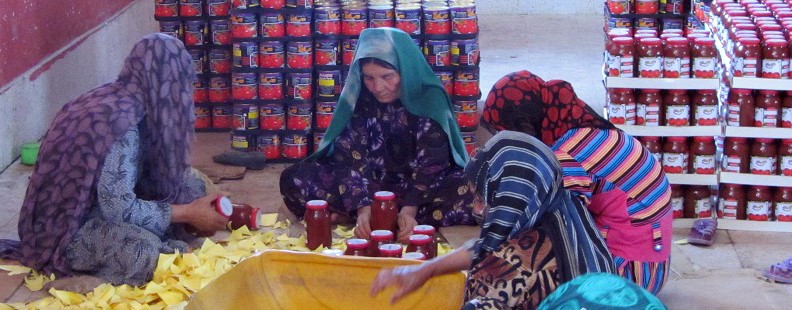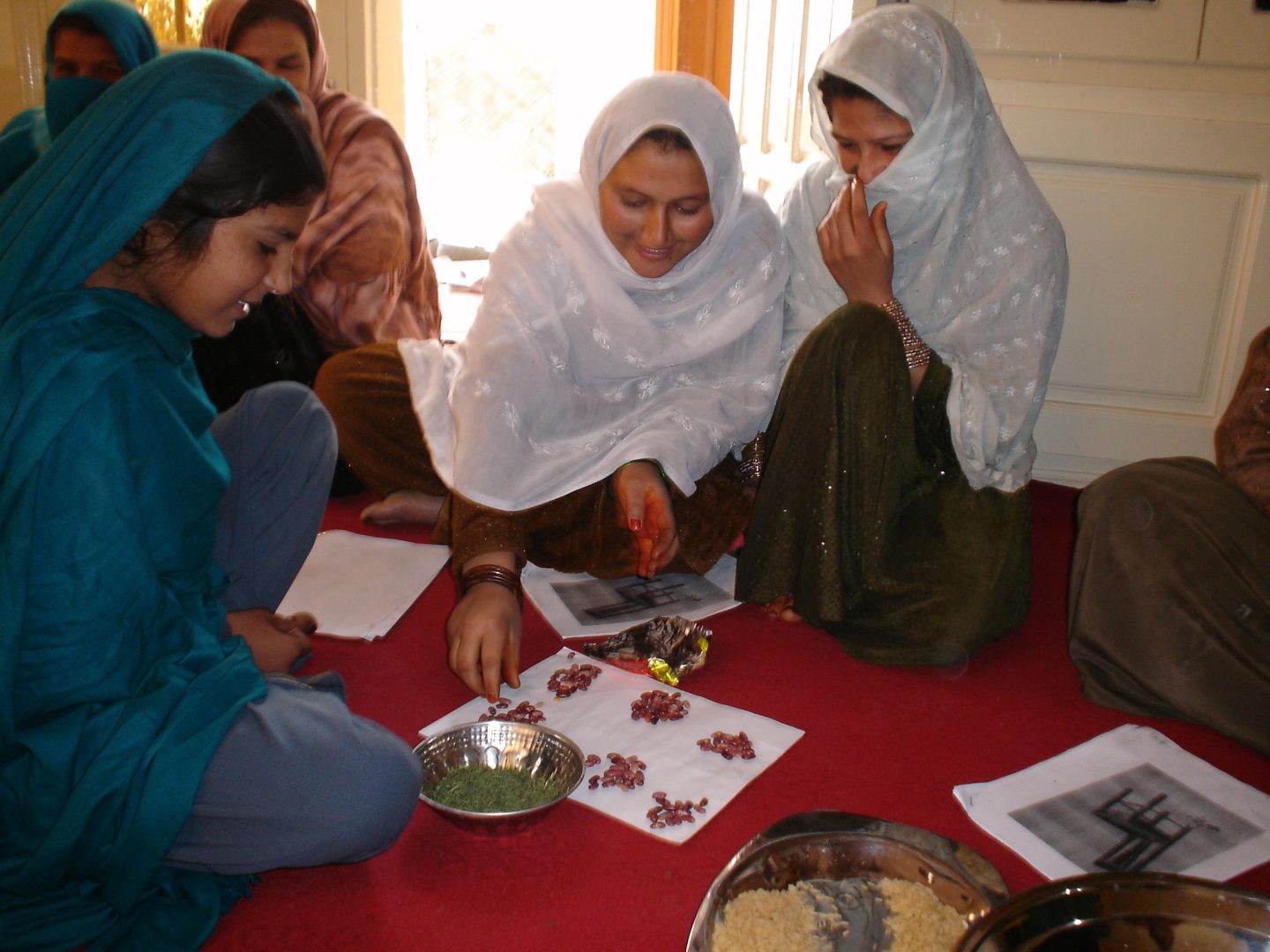
Women Home-Based Workers Network
In Afghanistan, almost 90% of women are illiterate. Most women are involved in home-based work.
Mina wrote a concept paper on how to work with these women. USAID were so impressed by the paper that they greenlit a 6 month pilot project offering training for the women. The training was especially difficult to design because so many of the women are illiterate.
800 women from the Mazar-e-Sharif district participated in the program. They learned business skills and ways to grow their business and earn more income. Three thousand women are still on the waiting list to join the program. In addition, the project created a network of 452 women who continued to support each other in their enterprises after the project ended.
Case Study: 19-year-old Wood Crafter
The 19-year-old Noorjahan Mahmoodzada sits contently at her woodcrafts shop at the Women’s Garden in Kabul. She is very pleased with the prospects of the meetings she has had at the recent Doing Business with Afghanistan Conference and Exhibition in India, facilitated through the USAID FAIDA project. She was able to sell some of her very detailed and sophisticated products to the Afghan and Indian audience, but more importantly, she has opened the gateway for exporting her products to India. She is also in discussion with an Indian company for purchasing specialized machinery for her work and importing it to Afghanistan.
Noorjahan looks forward to expanding her business and investing on improving the quality of the wood she uses for her products so it will have a longer life. She will continue working on the traditional Nuristani designs as that is her niche in the market.
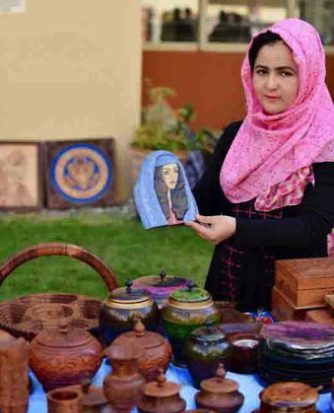
Ms. Mina Sherzoy was the first woman to empower women’s entrepreneurship in Afghanistan. My mother, Alieh Rafat, was also one of the fifteen women who participated for the first time in the handicrafts trade training held at the Ministry of Commerce & Industry (MOCI) under the leadership of Ms. Sherzoy. At that time, I was in school. One day, I participated in their training with my mother and I was very encouraged by Ms. Sherzoy. This encouragement made me very interested in doing business through the development of the wood carving industry in Afghanistan. I appreciate Ms. Sherzoy for always being a positive inspiration and supporting my journey to where I stand today.
Sincerely,
Noor Jahan
Case Study: A Success Story of a Business Woman in Ningarhar
Embroidery and Tailoring
AWBA is a Business Association established by the support of Ministry of Commerce in Afghanistan and USAID in 2003 in Kabul. It is legally registered and recognized by the government of Afghanistan. AWBA was established by the effort of Afghan Businesswomen to make known and enhance their contributions to Afghan economic growth though the roles that they play in all sectors such as trade, industry, agriculture import/export, construction, handicrafts, and education. The second AWBA office opened in Jalalabad at the Business Development Centre supported by the USAID ALP in April 2006. The project had mutual goals and objectives. The objectives of the project were to empower women in the private sector to face current challenges and expand their operation to increase the role of women in business and to enhance AWBA’s capacity skills
Jameela is a wife who is the member of AWBA and has big family she is the only women who is supporting her family. She lives in the Jalalabad City and started her business in 2002. At the beginning of her individual business, it could not meet the needs of her family, and there was no reasonable market to sell her goods.
Jameela produced products in the city because of the lack of information regarding the marketing and as well lack of link to business society and bossiness organizations that are currently supporting the business community and working for the brilliance of the country and new generation.
Jameela says that she had more problems extending her business because of a lack of financial resources, lack of raw materials, and traditional restrictions regarding marketing, but since special sectors and business organizations have paid attention to the development of business in Afghanistan, big changes came to Afghanistan particularly for businesswomen. These changes helped in developing this country and its younger generations. For poor and jobless women, the assistance which is being implemented by the various organization such as ALP, USAID, and AWBA is a golden chance for the women in the region and for the development of the country.
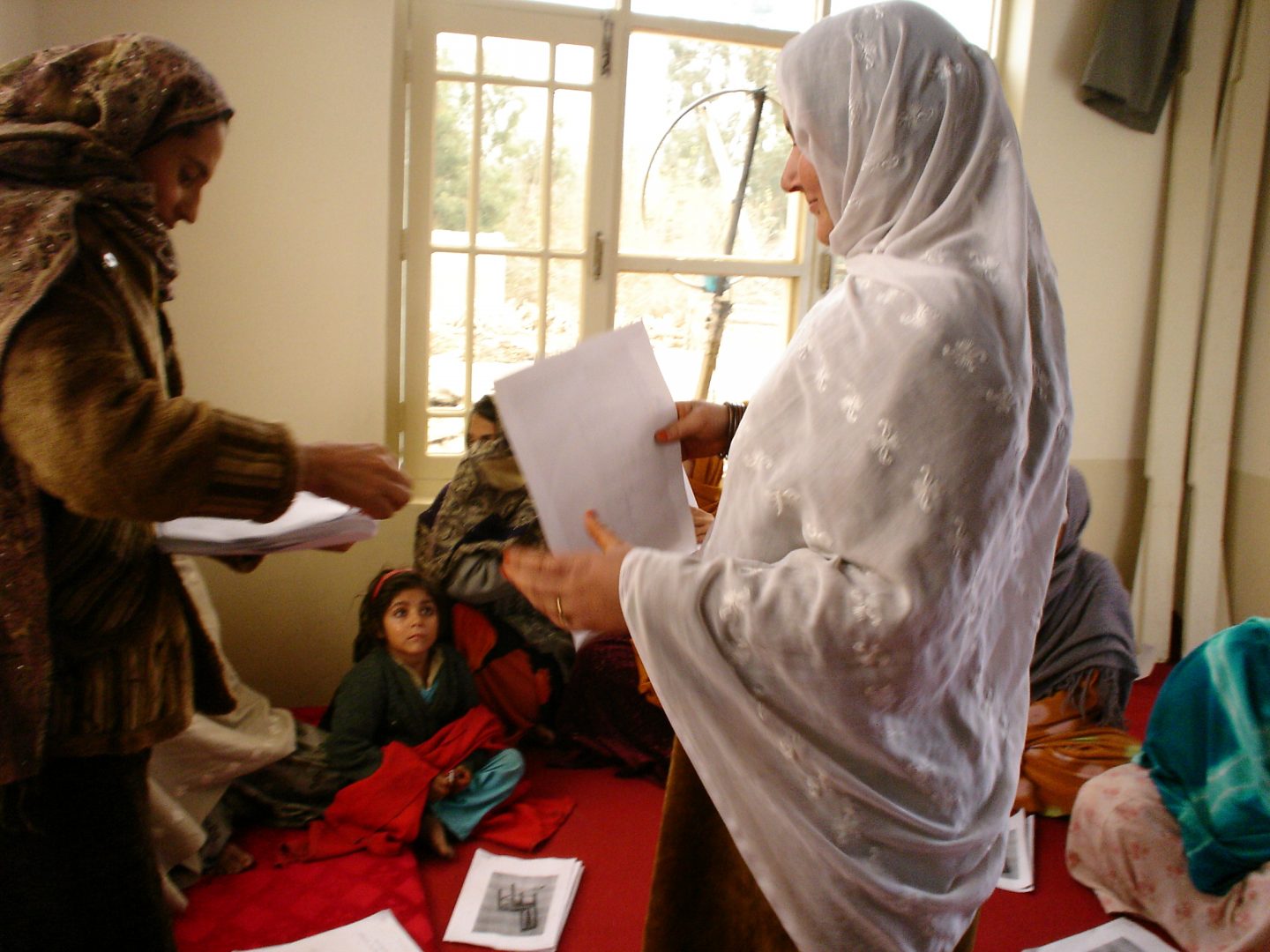
Case Study: Success Story of a Business Lady Today
The AWBA office visited those women engaged with business in Jalalabad city. As a result of the meeting, women were provided consults regarding marketing their products and accessing credit resources to solve their financial problems regarding their businesses.
During the meeting with a woman who is doing individual small business to support her family reported, “We are pleased to have a small business to support our family. I prepare four kinds of foods, such as Boolani, sauce, chips, and Pechora, only from potatoes on daily basis, and I prepare them to the be sold in the local market.” She stated that it had been 1 1/2 years since she started, and it was a success and has been a benefit to her family and children. However, she also pointed out the problems that she faced, including of lack of a permanent place for her business, limited financial resources, and municipality problems as women have no place shelter themselves. The government authorities insult them on daily basis, and when seasons change, they face different problems; therefore, they need a women’s market to establish a place where they can feel free and safe to sell their products. AWBA provided essential information by encouraging women to set up business.
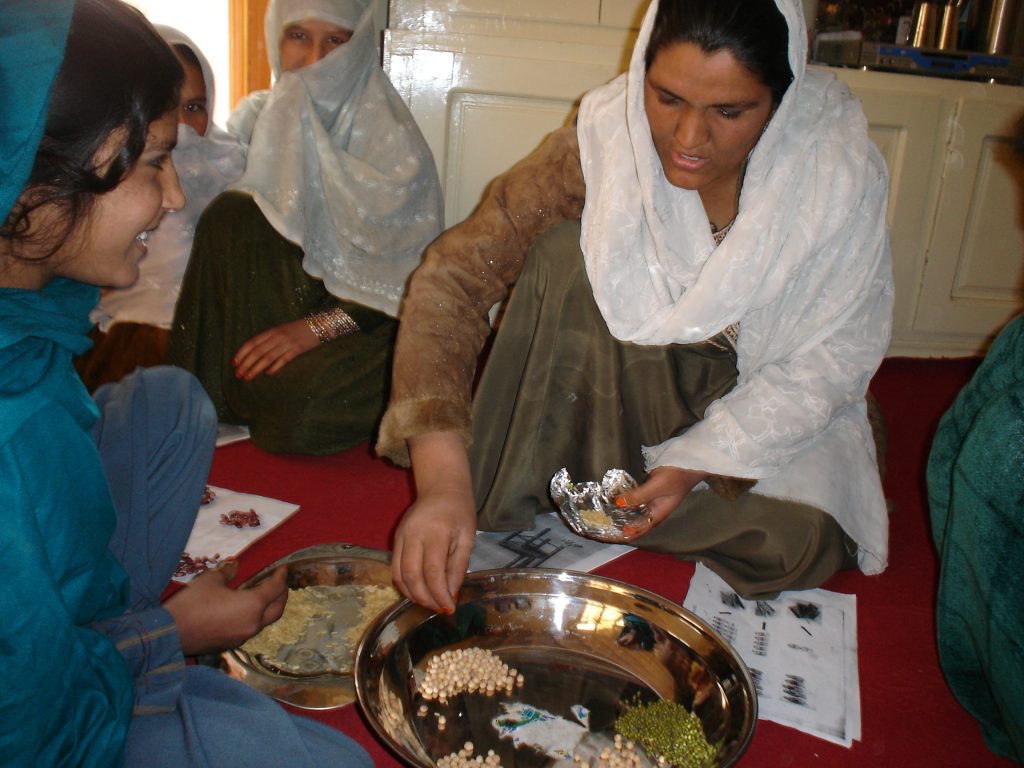
Case Study: Business Women Producer/Puckers
According to the work plan, the AWBA office visited women engaged with business in Jalalabad city. As a result of this meeting, women were provided consults regarding marketing their products, improving their business activities, and accessing credit resources to solve any financial issues. Additionally, regarding their business they mentioned some barriers such as a lack of tools, no permanent place to conduct business, and limited financial resources. According to the women, their businesses had a good local market both in Jalalabad and Kabul. Because of the AWBA consults, the women were able to have access to credit resources and improve their businesses, which included processing and selling dried fruits such as peanuts, walnuts, spices and other foods. They requested AWBA to provide business information and facilitate literacy programs.
During the meeting women stated that their businesses are currently being run by women. During the discussion, the women were asked who is supporting their businesses, The women reported that their male counterparts were helping them each year. They purchased the dried fruits according to the demands of the market during their processing period. The dried fruits were sold in the local market, as well in the Kabul market.
Women were very pleased with the training they received from the workshops and advisory programs and were willing to extend their business by acquiring long-term loans. Some of the women have individual businesses, and their net revenue each month is around 2000 Afghanis–a total success!
Case Study: Household Poverty Reduction through Handicrafts Making Skills
Despite progress in the economy, approximately 70% of the Afghanistan’s population continues to live in extreme poverty, with women experiencing the worst consequences. Women predominantly work in the informal sector (agriculture, commerce, manufacturing, handicraft, and transport), which accounts for 80-90% of the total economy. Economic projects are available, but many are unsustainable and are too small to create meaningful impacts. Women’s economic potentials are hampered by a lack of education, restricted mobility, inadequate capital and technical services, as well as poor technology.
AWBA builds capacity of Afghan businesswomen, assists to secure micro credit for businessmen and create direct economic opportunities for women to alleviate poverty and create jobs.
Crafts producers produce handicrafts for economic matters and for their own living. Handicraft production is one of the ever-light stars on the industrial face of the country, as Afghanistan once was known for its nice handicraft products that were produced in villages and cities by women and men. The handicrafts of Nangarhar are famous for their beautiful and sophisticated designs.
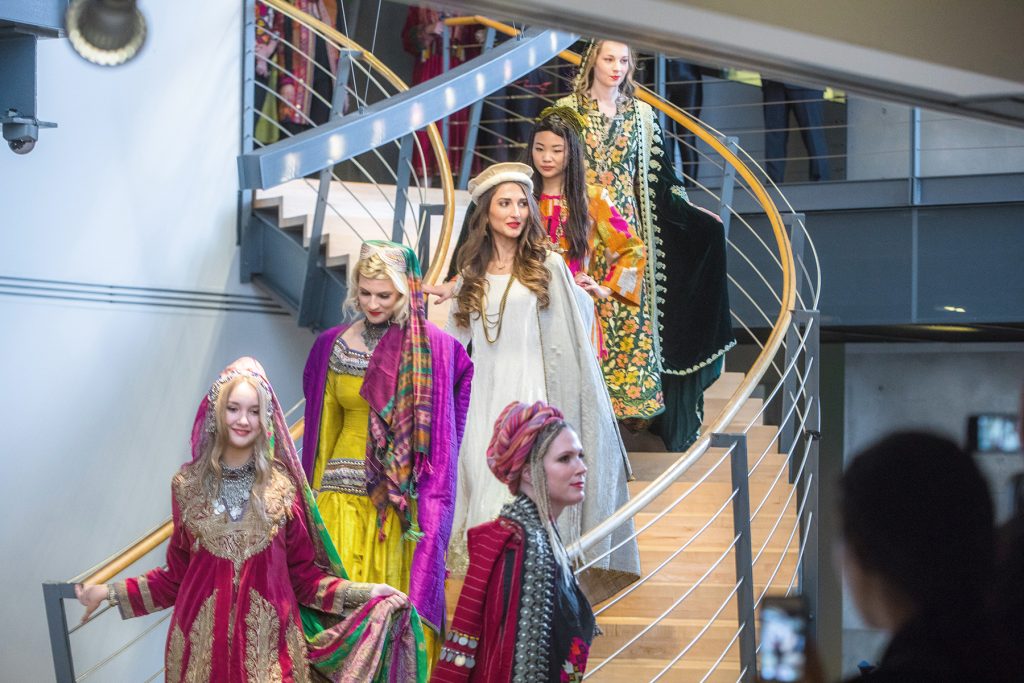
For example, Jamila Jan is one of the Afghan women who has received business and marketing training through AWBA. She was working in home alone and was not able to supplement her house’s daily expenses. After joining some trainings with AWBA, she was able to establish a center in her house. Around 20 women work in her sewing center. She was introduced by the AWBA office to the First Micro Credit Bank in Jalalabad and received a loan for her business expansion. “A group of women work daily in my center, and I am pleased that I can support my and other women’s families through my center,” said Jamila.
